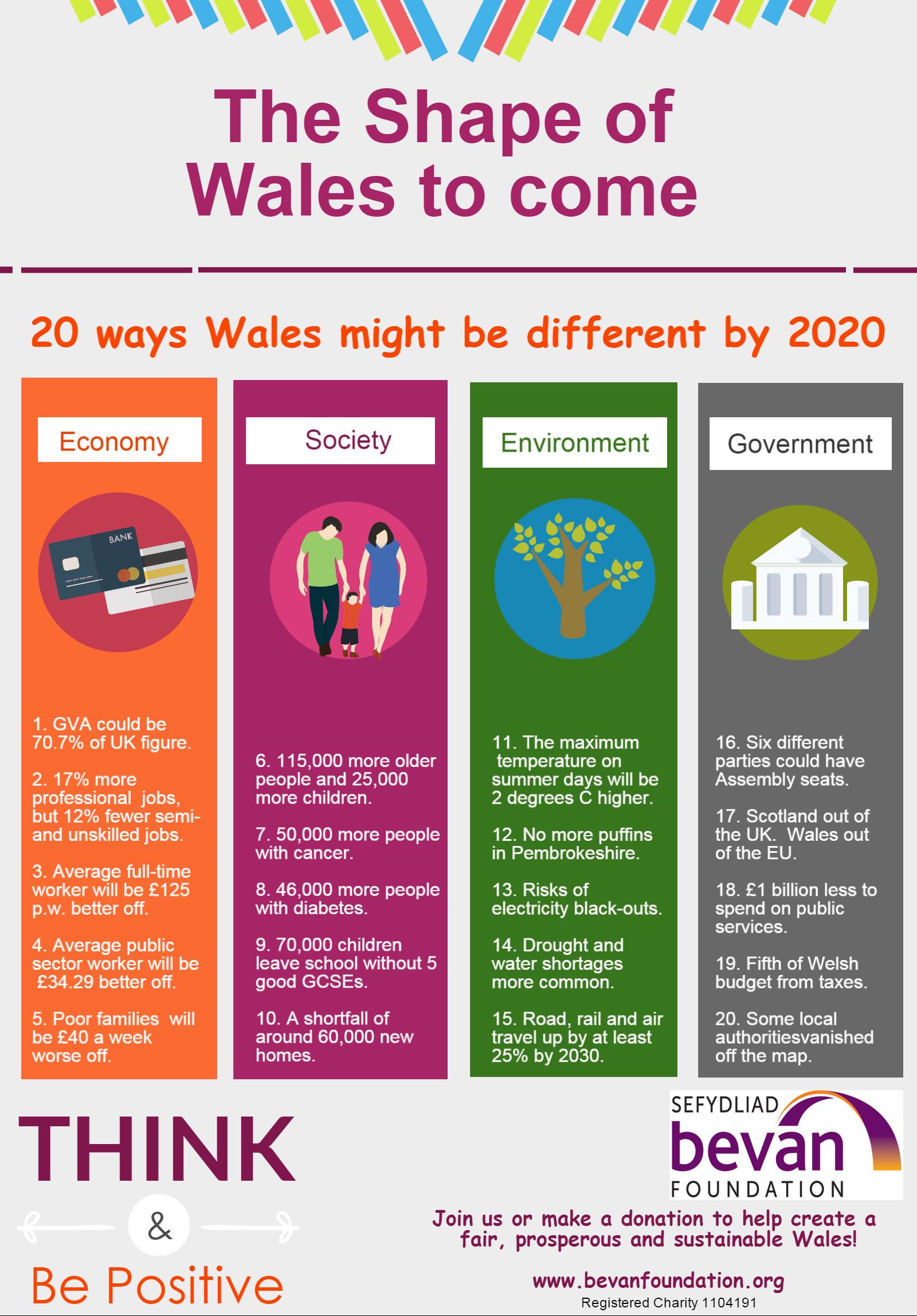 Bevan Foundation
Bevan Foundation 
Our latest report is a brave exercise in looking ahead over the next five years to see what Wales might be like in 2020.
We’ve pulled together a huge range of forecasts and predictions, ranging from the Office for Budget Responsibility’s and PriceWaterhouseCooper’s forecasts for the UK and Welsh economy, to those of health charities on the likely incidence of cancer, to those of political pundits on the possible political composition of the Assembly after the 2016 election.
Why did we do it?
There is no shortage of reports, articles and datasets that tell us about Wales’ current problems – or indeed, as data is often quite old, about yesterday’s problems. But there is very little indeed that tells us about tomorrow’s possible problems, so that the problems can be avoided or at least minimised. The kind of futures work that is common in other parts of the UK is – apart from a somewhat dated Welsh Government report – completely missing for Wales.
What did we find?
There is no escaping that the findings make for depressing reading. Whether it is forecast increase in extreme weather, the rising incidence of killer diseases, the projected shortage of housing or the downward trend in the Welsh economy, for many people in Wales the next five years look extremely tough.

These challenges, combined with the forecast reduction in public spending, mean that business as usual is simply not an option. With much less money to spend and ever increasing demands for support, something has to change and change fast.
We will working on solutions in the coming months and years, but as a first step we suggest that Welsh politicians, policy-makers, service providers and the public need to answer some basic questions. These are:
1. What should be the role of the state, business, third sector and citizens?
The go-to solution for almost all of Wales’ ills over the years has been for the government to take action. With limited resources that will no longer be an option. So perhaps it is time for the business sector and individuals to step up to the plate. For example, instead of seeing private landlords as the bogey-man, perhaps privately-rented homes should be seen as part of the solution to the housing crisis.
2. How should scarce resources be used?
The conventional approach is for the Welsh Government to provide services or to provide grants. But there are other tools in its box – it could invest, legislate, tax or offer tax credits to name but a few. Frankly there are few ideas about using the rest of the Welsh Government’s kit yet we need them desperately [hence our own project on new taxes].
3. How should resources be targeted?
There needs to be an honest discussion about universalism and targeting, and about place-based versus people-based approaches. For all the merits of universalism, there needs to be a discussion about whether some resources could be better spent (for example, we need to discuss why pensioners get free, unlimited bus trips while all but the poorest school children have to pay for their meagre school dinners).
4. How should we involve people?
Aside from “co-production” – a word which I detest incidentally – there is no real drive to engage people in the decisions that affect them. But unless we draw on the many skills and talents of people in Wales – who, apart from the environment, are frankly all that we have got – then we will never get the change we need. The resistance to austerity that is springing up elsewhere in the UK is largely absent from Wales. The kinds of alternative approaches to economic development have not really taken off here. Why not?
We’re all too aware that forecasts and predictions can be wrong, as the 2015 General Election outcome reminded us. We were also very aware of Donald Rumsfeld’s ‘unknown unknowns’ that can trip up anyone brave enough to have made a forecast. But even if some of the projections are only partly right, the direction of travel is clear – Wales is not heading for nirvana.
The issues we’ve raised in this report are deep-rooted and complex. We urge you to read it in full and to let us know what you think.
Victoria Winckler is Director of the Bevan Foundation.


